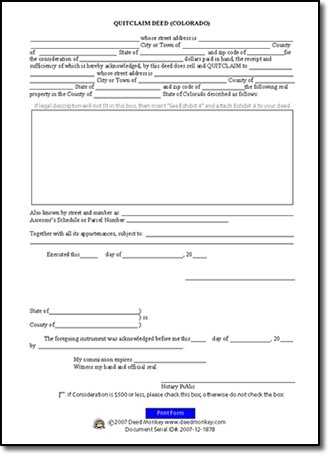Quit Using Quitclaim Deeds!
Post on: 6 Май, 2015 No Comment

The quitclaim deed is supposedly the duct tape of the real estate business – you can use it to fix anything! But in fact, a quitclaim deed often does much more harm than good .
Before you can understand how a quitclaim deed works (or rather does not work), you must first know about its much more helpful and responsible brother, the warranty deed. That upstanding document features (you guessed it) a warranty – specifically a warranty of title. By using a general warranty deed, the party who signs it (the grantor) is promising the party who receives it (the grantee) that the grantor has good title to the property being conveyed – that the grantor really, truly owns the property, and that the grantor has the right to convey the property to somebody else. If the grantor is wrong about this, or if he has lied, then the grantee may sue him for making a false representation and/or breaking his promise. Knowing that a grantor is warranting his title to the property gives the grantee and everyone else involved in the transaction a warm, fuzzy feeling of security.
But what if there was no warranty of title in a real estate transaction? What if instead the grantor told you that there was no guarantee that he actually owns the property and that he would promise you nothing? That is the essence of a quitclaim deed, which contains no warranty of title whatsoever. How would you feel about taking title to a property by a quitclaim deed, without a warranty of title? Certainly not warm, fuzzy, and secure. Instead, you’d probably feel like you just bought a Rolex from a guy standing on the corner.
Even in the case where a grantor using a quitclaim deed does actually have good, legitimate title to the property, the use of the quitclaim deed will imply that he does not have such title, which means that the quitclaim deed will still be considered a break in the property’s chain of title. Often grantors are counseled to use a quitclaim deed as a shield against liability, under the theory that they cannot be sued by their grantees if no warranty (no promise) of title is ever made by them. But the reality is that once a grantee realizes that the grantor’s quitclaim deed has damaged the property’s title, he will come knocking on the grantor’s door (with a lawsuit in hand, if necessary) to get what he paid for. At that point, the grantor will discover that no liability shield is absolute, and that by using a quitclaim deed the grantor has only outsmarted himself .
Likewise, quitclaim deeds are rarely capable of legitimately fixing problems with a property’s title. Just like a car mechanic or a plumber who won’t warrant their repairs, doubt should be cast on any deed which contains no warranty.
So why are quitclaim deeds even allowed to exist? Well, they can be useful in certain limited situations, particularly for settling lawsuits where someone has wrongfully claimed an interest in property and is thereafter forced to “quit” his claim. But only an experienced real estate attorney can be trusted to determine when a quitclaim deed will be acceptable for the intended purpose. Therefore, when seeing or even hearing the word “quitclaim”, you should immediately call your legal counsel . And please, please never suggest a quitclaim deed to someone else, or else the claim may soon be against you!














